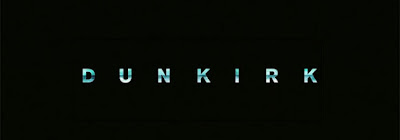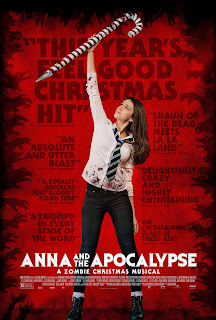Dunkirk (Dir. Christopher Nolan, 1h, 46m)
Christopher Nolan is, for a director who brought a sophisticated and adult touch to both science-fiction and superhero movies, a remarkably divisive figures-some of his detractors regard his films as overcomplex, grim, and overly long slogs, and even his staunchest fans agree his films occasionally devolve into plotline juggling fests. Dunkirk thus, comes as a pleasant surprise-his shortest film (at just 106 minutes) since his directoral debut, a taut, visceral tale of the rescue of the retreating British Expeditionary Force from the French coast that focuses on three men, one each on land, sea and in the sky, interweaving their tales to bring the events of a week on the embattled beach, a day in which the "Little Ships" came to the rescue of over 400,000 men stranded on that beach, and an hour in which a pilot does battle with the German airforce so that the Little Ships can rescue those on the beach. Together, though there are flaws here and there, these three strands come together to tell a gritty, bloody but ultimately uplifting tale.
Just as Nolan cuts his story into three, so this review shall be. First, the action. Whilst others have described this film as, not wholly incorrectly "the first twenty minutes of Saving Private Ryan, on repeat, but louder", this does the film a decided disservice. Dunkirk, in short, is brutal-boats are blown up, listing to one side as injured, civilians and soldiers are tipped or jump into brackish water-people are shot at, bombed, blown up, drown; the fact that this often comes without warning, save for the unmistakable "Wall of Jericho" scream of the Stuka (whose ever ascending siren haunts Hans Zipper's score) announcing that, once again, absolute carnage is about to occur, people are about to die and there is nothing anyone can do about it, until the eventual arrival of the RAF brings hope. At points the film is hellish-the audience are as much a sitting duck, wincing and jumping a little at the (incredibly well mixed) sounds of bullets, bombs, guns and death, as the men on the beach
.
It is thus to Nolan's credit that none of this seems either glorified or gratuitous-whilst a couple of shots of Farrier (an RAF pilot played by Tom Hardy)'s Spitfire are as close as the film ever gets to a classic war movie, the majority of it is sombre-Nolan never lingers, as Spielberg occasionally did in Private Ryan, upon the injured or dying, except on occasion, and when he does, as with a particularly moving shot of a pile of discarded helmets, it's with pathos and a quick cut to the next piece of action; like the men on the beach, Dunkirk needs to keep moving to survive; its ticking soundtrack and increasing focus on minutes and second and even milliseconds underpin this perfectly . Nor do we ever see the enemy combatants-this humanising of what Nolan portrays simply as an ever-encroaching, ever-present threat would have fatally undermined and overcomplicated the film.
This said, the setpieces, which the film often reframes and replays from another perspective later or earlier in the narrative are spectacular, and terrifying in equal measure, often shot from the water level, looking up, or else distorting, as with one scene of a sinking ship, the angle, and framing of the action. Even in the case of the sequences aboard one of the "Little Ships" with Mark Rylance's Mr Dawson, the larger ships and even the sea seem to loom in, to threaten to sink the small boat at points-like the soldiers on the beach, there is the constant threat of attack. Farrier's scenes, in comparison, are far more fluid, and the dogfights are some of the best put to celluloid ever, equal parts balletic and chaotic as Farrier and his wing man Collins have to dodge, evade and out-think the Luftwaffe, and the final sequence of Farrier flying is singularly breathtaking, and almost elegiac.
To the actors themselves. The trio of Hardy, Rylance and Kenneth Branagh as Mole Commander Bolton are all excellent actors, Hardy's pilot and Branagh's commander both exhibiting a mix of quiet desperation and British stiff upper lip, though both see cracks in this facade at critical moments-the scene in which the Little Ships finally arrive brings not only Branagh but also, seemingly, the audience to tears. Rylance's Mr Dawson, however, is an older and more careworn man, already bearing the emotional scars of war, and, one could assume based upon the real life that forms the basis for his characters, the emotional impact of the Great War-the fact that it is upon his, as well as the many other civilian captains, shoulders that the fact of his country lies does not escape him, and at points, his bravery is greater than any of the professional soldiers in the film. There is, without doubt, a quiet dignity, a quiet bravery to Mr Dawson, and Rylance performs this perfectly. His son, Peter and hand, George echo this, though for one of the two young men, their sacrifice to country is almost as great as the stranded men on the beach, yet is dealt with in a dignified and restrained way.
Forming the greater part of the cast, and the young men on the beach; young star Fionn Whitehead is a perfect lead as Tommy; at points utterly frozen by the savagery and brutality of the battle around him, it's certainly clear, however, that by the end of the film, he is a changed man, forever changed, as the shell-shocked soldier Mr Dawson picks up earlier in the film, but, as with the rest of the British Army, alive, to fight on-whilst Tommy has few lines, his facial acting tells more than any words ever could, as he often struggles to deal with the carnage and violence that unfolds on the beach, as well as the uncomfortable actions that some of his comrades will turn to in order to get home.
Harry Styles makes for a good foil to Tommy; older, a little more morally grey, and clearly more worn down by the war, it's a remarkably strong performance, regardless of Styles' motive behind moving into acting-much like David Bowie(who one cannot help but compare, at least in this aspect)'s Mr Lawrence, he may not be the protagonist, and certainly Alex never seems to be, nor seeks to be heroic, but he is the catalyst for much of the action that takes place. The third part of this trio, Gibson, is a man ruled by what he has seen-silent for much of the film, and fearful for the rest, refusing to go below deck for example when rescued, he often seems emblematic of the damaged men, utterly and irrecoverably changed by his experiences in Normandy and beyond.
The plot, honestly, is where the film falters a little, but this comes less in the story itself but in the way it is told-with a week of events involving Harry, Tommy and Gibson around Dunkirk Beach, a day of events aboard Mr Dawson's tiny boat, and a single hour in the air with Farrier, it could have been very easy to have all three narratives use this week as buildup, to flesh out Farrier and Mr Dawson's lives, with Mr Dawson hearing Churchill's call for the Little Ships, to have Farrier scrambled late into the film, and have all three parts of the narrative come together in a linear way and then split apart as needs be.
This being Christopher Nolan, however, the story is told almost thematically, and in a non-linear way. In places, it works supremely well-there's a tonal cluster of character introductions, tonal clusters of action and peril, and the effect at the film's denouement is the same, as though Nolan has compressed the three narratives down to the same timescale so that the rescue itself is seen through all three characters at around the same point. There, it works perfectly. Elsewhere, however, the film honestly trips itself up on occasion-a character is put in peril, only for us to see a familiar plane, boat or face come to their rescue.
In one particularly glaring example, by the time the soldiers on the beach reach a certain boat, we already know this boat will get out to see and that this will lead to a rescue of some sort-for a film working on almost perpetual peril, this undermines the film at points fatally. There are a few moments in which this is edited superbly, and exactly whether a certain character has survived is entirely hidden-in other places, a re-edit of the order of scenes could well add suspense back to the film in the few moments where it lapses. There are also a few moments in which a little more than the very broad and surprisingly thin brush-strokes that make up each character could do with a little detail, even if this were to be shown visually, as much of this film does to great effect.
Despite these, Dunkirk is a superb film, not only poignant, and indeed bittersweet in the end, despite the fact that so many survived to "fight them on the beaches" and defend the British Isles. Everyone loses something on the beaches of Dunkirk, from their freedom or innocence, to their friend to their life. Nolan has made a film not only anti-war but one that sets a new bar for just how realistically the feeling of being on a battlefield under fire can be portrayed; if other films use "war is hell" as hyperbole, then Dunkirk thrusts us right into the flames of it-with a slightly tighter edit, this could become one of the greatest war movies ever-as it is, it's a chaotic, churning, ticking portrayal of rescue at any odds.
Rating: Highly Recommended



Comments
Post a Comment